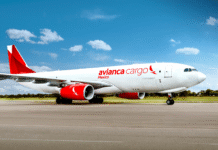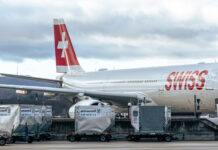The importance of air cargo at Swiss International Air Lines
It is no secret that logistics and transport play an important role for the Swiss economy, especially as economic indicators reveal that every third franc is exported and every sixth franc imported via air cargo. With such high demand, SWISS has invested greatly into carrying not only passengers, but also airfreight. Swiss WorldCargo plays a significant role for the airline and the national economy by moving goods in, out and via Switzerland on a daily basis, and bringing these to the wide-ranging SWISS & Edelweiss network.
Swiss WorldCargo: strength is not always a matter of size
As one of many components of such a large organisation, what role does Swiss WorldCargo play? In a company of over 9,000 employees, Swiss WorldCargo’s 350 people worldwide may seem quite small. However, strength does not always come in numbers – Swiss WorldCargo has been able to make a mark by being nimble and agile. Without operating any freighters, Swiss WorldCargo solely ships on the Swiss International Air Lines and Edelweiss fleet, to and from destinations that are part of the global network. However, with this extensive network at hand, augmented by trucking options, Swiss WorldCargo has positioned itself among the top players of the industry, with a well-recognised brand and reputation.
A substantial contribution to the SWISS’ revenue
Cargo plays an important role to the total results of SWISS. “The yearly contribution of cargo to the SWISS bottom line has been an impressive figure for the last few years. In fact, cargo has continued to contribute over 10 per cent to SWISS’ revenues and a substantial part to the overall SWISS result,” said Michael Niggemann, Chief Financial Officer with Swiss International Air Lines. “That’s no small feat,” he added. Certainly, cargo provides a financial level of support to the company, with its steady addition to total revenue and contribution. For SWISS as a whole, maximizing capacity is not only filling its flights for passengers, but also ensuring that the belly capacity is optimally utilized.

Route planning is also a matter of cargo
This can all best be accomplished in a collaborative way in which the passenger and cargo sides, respectively, work together. Cargo planning factors into any decision to open a new route – and usually, high-value business markets also offer plenty of shipping opportunities. On the aircraft itself, planning is set up to allot a specific amount of space to both passengers and cargo. On the SWISS Boeing 777-300ER, roughly 340 seats are offered in a three-class configuration. Beneath these seats, however, an additional space of between 20 to 25 tonnes of additional weight can be held.
Cargo influences flight operations
“On a given flight, cargo of course factors into various parts of the operation,” said Oliver Buchhofer, Head of Flight Operations with SWISS. “In the preparation phase, for example, we need to know the weight of the loaded cargo, as this influences our fuel calculations. Furthermore, we need to know what types of goods are loaded and if they need cooling or heating, in order to set the controls accordingly inflight. This influences the fuel calculations too, as temperature regulation causes higher fuel consumption.”
As SWISS continues to expand its fleet size, this also reflects on its cargo operations. With the addition of two Boeing 777-300ERs in 2020, offered capacity will increase as well. And with each new destination and additional flight or plane, available cargo space will continue to increase, as will our sales capacity.

In
2018. Swiss WorldCargo contributed over 10 per cent to the total SWISS
revenues.
Swiss WorldCargo: a niche position
Each division of Swiss International Air Lines is responsible for ensuring that the aircraft in the fleet take off in a timely manner and safely transport their passengers to the network spread throughout the world. Cargo, as one of these divisions, has carved out a niche position for itself. Swiss WorldCargo, with its focus on care intensive and special cargo, ensures that flights remain full and that the additional space on each aircraft – whether it is heading to a short, medium or long-haul destination – is used properly to ensure storage and additional usage of the cargo hold. By doing so, the airline can offer additional service to customers wanting to ship products around the world at a quick pace.
Fuente: https://blog.swissworldcargo.com/2019/09/in-the-belly-of-the-swiss-fleet/


















